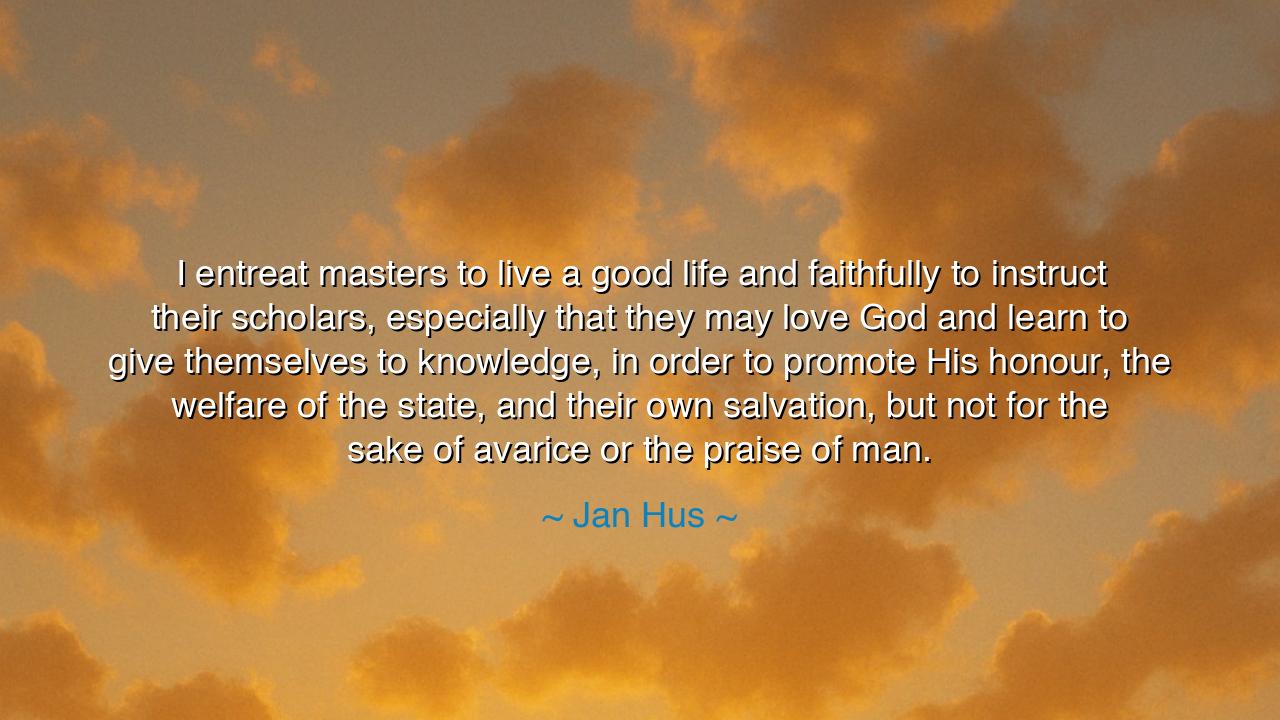
I entreat masters to live a good life and faithfully to instruct
I entreat masters to live a good life and faithfully to instruct their scholars, especially that they may love God and learn to give themselves to knowledge, in order to promote His honour, the welfare of the state, and their own salvation, but not for the sake of avarice or the praise of man.






The words of Jan Hus ring through the corridors of time with the clarity of conscience and the fire of conviction: “I entreat masters to live a good life and faithfully to instruct their scholars, especially that they may love God and learn to give themselves to knowledge, in order to promote His honour, the welfare of the state, and their own salvation, but not for the sake of avarice or the praise of man.” These are not the musings of a scholar in comfort, but the plea of a martyr whose devotion to truth burned brighter than the flames that would one day consume his body. In this quote, Hus speaks not merely to teachers of his time, but to every soul entrusted with the sacred duty of guiding others toward wisdom, virtue, and divine purpose.
Born in the late 14th century in Bohemia, Jan Hus lived in an age when knowledge was both a blessing and a weapon. The Church, the most powerful institution of his day, had become enmeshed in corruption, and learning itself was chained to the service of wealth and vanity. Hus, a priest and scholar, sought to restore learning to its holy roots—to the love of God, truth, and service. When he entreated masters to live a good life, he meant that education without morality is a house built upon sand. For what good is the teacher who speaks of virtue but does not live it? What worth has knowledge that is pursued for greed or fame, and not for the honour of God and the good of mankind?
In the ancient spirit of wisdom, Hus echoes the old philosophers and prophets who knew that knowledge is sacred only when bound to virtue. Socrates taught that the unexamined life is not worth living; Confucius taught that learning without integrity is empty. So too did Hus proclaim that to instruct others in knowledge without faithfulness and righteous living is to betray both heaven and humanity. The teacher’s soul, he believed, must first be purified by humility and devotion before his words can enlighten others. For a corrupt teacher breeds not wisdom but decay in the minds of his pupils.
History itself bore witness to his teaching. Hus’s life was a living sermon. He refused to bend to the corruptions of the Church, even when threatened with death. He taught the Scriptures openly, in the language of the people, defying the edicts of the powerful. His university lectures were filled not with flattery, but with truth—truth that cut deep into hypocrisy. For this, he was branded a heretic and condemned. Yet even as the flames rose around him, Hus prayed for his enemies, proclaiming that the truth he taught would rise again in a hundred years. And indeed, it did—through Martin Luther, who ignited the Reformation that transformed the Western world.
The heart of Hus’s quote is a vision of education as sacred service. To love God, to pursue knowledge, and to promote the welfare of the state—these were not separate aims but one harmonious calling. Knowledge, he taught, is not for personal elevation but for the upliftment of all. When a teacher’s purpose is corrupted by avarice—the hunger for gold—or by praise, learning becomes a hollow idol. But when guided by truth and humility, education becomes a divine flame that illuminates generations. In every age, this lesson remains: the worth of knowledge lies not in how much one knows, but in what one does with that knowing.
Consider the teachers who shaped the destiny of nations: Socrates in Athens, Confucius in Lu, or Florence Nightingale teaching compassion through service. Each lived not for applause, but for duty. They understood, as Hus did, that true education awakens the moral and spiritual faculties of mankind. It builds not only scholars but citizens; not only intellect but character. The good teacher is like a candle—burning itself away to bring light to others. Such a life, though unnoticed by the crowd, glows eternally in the soul of humanity.
Let us then heed the call of Jan Hus. Let those who teach and those who learn alike remember that knowledge without virtue is a sword without a hilt—dangerous even to its wielder. Let every seeker of truth begin first with humility, every teacher with integrity. Seek wisdom not for wealth, but for service; pursue learning not for fame, but for understanding. Live well, speak truth, and pass on light. For the glory of knowledge lies not in what it gathers, but in what it gives.
And so, across the centuries, Hus’s words stand as both warning and invitation. The teacher’s path is a sacred one, demanding not brilliance alone, but goodness. To live rightly and teach faithfully—this is the foundation of all civilization. Let each generation remember: it is not gold, nor armies, nor laws that sustain the state—it is the wisdom of its teachers, the virtue of its leaders, and the purity of its purpose. In the quiet heart of such truth, the spirit of Jan Hus still lives, eternal as the flame that once bore his name to heaven.






AAdministratorAdministrator
Welcome, honored guests. Please leave a comment, we will respond soon